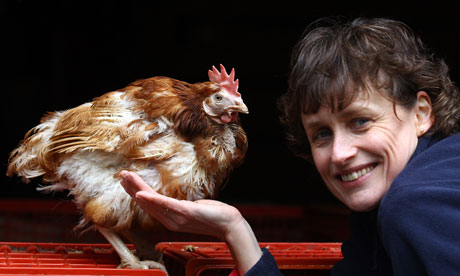- Dec 11, 2011
- 19
- 0
- 22
Last battery hen given a new home
Liberty rehomed by charity before ban abolishing battery cage system comes into effect on 1 January
www.guardian.co.uk/environment/2011/dec/29/last-battery-hen-home-liberty
Liberty rehomed by charity before ban abolishing battery cage system comes into effect on 1 January
www.guardian.co.uk/environment/2011/dec/29/last-battery-hen-home-liberty
Press Association
guardian.co.uk, Thursday 29 December 2011 17.52 GMT

Jane Howorth from the British Hen Welfare Trust with the newly liberated Liberty. Photograph: Matt Cardy/Getty Images
A chicken described as Britain's "last battery hen" has been given a new home, marking the end of an era for commercial laying hens, a charity said.
The hen, which has been named Liberty, will enjoy retirement at a farm in Chulmleigh, Devon, where it will join about 60 other ex-battery hens.
An EU directive abolishing the barren (battery) cage system comes into effect on 1 January, when egg producers will have to provide hens with larger cages enabling them to spread their wings and move around.
The British Hen Welfare Trust, set up in 2005, has rehomed thousands of hens across the country.
"Today is a major milestone in the life of the commercial laying hen in Britain and I'm pleased that improved welfare changes are being implemented," said Jane Howorth, the trust's founder.
The trust appealed to the public in November to help rehome as many of the last batch of battery hens as possible, hoping it could find new homes for about 6,000 hens.
The response was so high that it has rehomed nearly 15,000 almost 6,000 of which were rehomed in three days between Christmas and the new year, the charity said.
But Howorth said there were still a number of challenges ahead of them.
"These things are never simple, and whilst Britain is complying with the new legislation, many overseas countries are not, and we will continue to see battery eggs imported into the UK, many of which will end up in processed food," she said.
"This will provide a challenge for British farmers who will struggle to compete with lower welfare, cheaper egg imports from abroad. So we urge consumers to continue supporting our British farmers and always insist on British and wherever possible free range eggs."
British egg farmers have invested an estimated £400m to comply with the new regulations, but the charity said up to a third of other EU member states would not be ready.
The trust added that under the new regulations cages can hold up to 90 birds, but they must have space to spread their wings, perch and be able to go from one end of the cage to the other, with 750sq cm of space for each bird.
The old-style cages had just 550sq cm of space less than a sheet of A4 paper.
The British Hen Welfare Trust, which started out as a one woman with a van operation, said that at the last count it will have rehomed more than 300,000 ex-battery hens by the end of 2011.
guardian.co.uk, Thursday 29 December 2011 17.52 GMT

Jane Howorth from the British Hen Welfare Trust with the newly liberated Liberty. Photograph: Matt Cardy/Getty Images
A chicken described as Britain's "last battery hen" has been given a new home, marking the end of an era for commercial laying hens, a charity said.
The hen, which has been named Liberty, will enjoy retirement at a farm in Chulmleigh, Devon, where it will join about 60 other ex-battery hens.
An EU directive abolishing the barren (battery) cage system comes into effect on 1 January, when egg producers will have to provide hens with larger cages enabling them to spread their wings and move around.
The British Hen Welfare Trust, set up in 2005, has rehomed thousands of hens across the country.
"Today is a major milestone in the life of the commercial laying hen in Britain and I'm pleased that improved welfare changes are being implemented," said Jane Howorth, the trust's founder.
The trust appealed to the public in November to help rehome as many of the last batch of battery hens as possible, hoping it could find new homes for about 6,000 hens.
The response was so high that it has rehomed nearly 15,000 almost 6,000 of which were rehomed in three days between Christmas and the new year, the charity said.
But Howorth said there were still a number of challenges ahead of them.
"These things are never simple, and whilst Britain is complying with the new legislation, many overseas countries are not, and we will continue to see battery eggs imported into the UK, many of which will end up in processed food," she said.
"This will provide a challenge for British farmers who will struggle to compete with lower welfare, cheaper egg imports from abroad. So we urge consumers to continue supporting our British farmers and always insist on British and wherever possible free range eggs."
British egg farmers have invested an estimated £400m to comply with the new regulations, but the charity said up to a third of other EU member states would not be ready.
The trust added that under the new regulations cages can hold up to 90 birds, but they must have space to spread their wings, perch and be able to go from one end of the cage to the other, with 750sq cm of space for each bird.
The old-style cages had just 550sq cm of space less than a sheet of A4 paper.
The British Hen Welfare Trust, which started out as a one woman with a van operation, said that at the last count it will have rehomed more than 300,000 ex-battery hens by the end of 2011.
Last edited:




